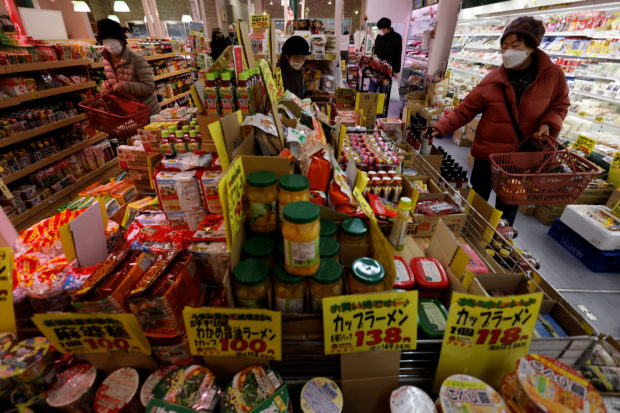Japan’s consumer inflation hits 41-year high, keeps BOJ under pressure

Shoppers check food items at a supermarket in Tokyo, Japan January 20, 2023. REUTERS/Issei Kato/File photo
TOKYO – Japan’s core consumer inflation hit a fresh 41-year high in January as companies passed on higher costs to households, data showed on Friday, keeping the central bank under pressure to phase out its massive stimulus program.
The data underscores the dilemma policymakers face as soaring fuel and daily necessity prices hit households, many of whom have yet to see wages rise enough to make up for the higher cost of living.
The nationwide core consumer price index (CPI), which excludes volatile fresh food but includes energy costs, rose 4.2 percent in January from a year earlier, matching a median market forecast.
The rise, which followed a 4-percent increase in December, was the fastest pace since September 1981.
Core consumer inflation has now exceeded the Bank of Japan’s 2 percent target for nine straight months, mostly reflecting persistent rises in fuel and raw material costs, the data showed.
Article continues after this advertisementIncoming Governor Kazuo Ueda faces a challenge in sustaining the BOJ’s yield control policy, which has come under attack by markets betting strong inflation will force the bank to raise interest rates.
Article continues after this advertisementUpon approval by parliament, Ueda is expected to succeed incumbent Haruhiko Kuroda when his term ends in April. At Ueda’s debut policy meeting on April 28, the BOJ will release for the first time its inflation forecasts extending to fiscal 2025.
Japan’s economy averted recession in the fourth quarter of last year but rebounded much less than expected as business investment slumped.
While private consumption is holding up against headwinds from rising living costs, uncertainties over the global economic outlook will weigh on Japan’s delayed recovery from the scars of the COVID-19 pandemic, analysts say.